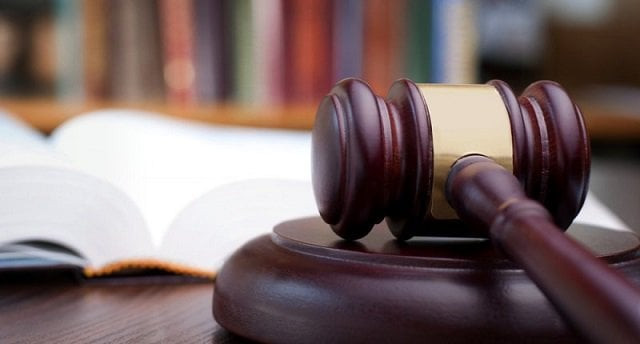Child courts open in Mardan, Abbottabad
Will provide expeditious justice to children in contact or in conflict with the law

Representational image. PHOTO: REUTERS
The efforts to establish child courts in Khyber-Pakhtunkhwa aim at providing expeditious, child sensitive and fair justice to children in contact or in conflict with the law as envisaged in the Juvenile Justice System Act, 2018, the K-P Child Protection and Welfare Act, 2010 and the Constitution of Pakistan.
The project was developed with the technical and financial support of Group Development Pakistan and the British High Commission.
Accompanied by child rights activists, judicial officers, lawyers, and civil society members, Chief Justice Seth visited both the Child Courts, materially transformed and equipped, to create a child-conducive environment so that children coming to the court would feel comfortable and safe. The colourful walls, handmade drawings, toys, books, swings, green environment along with the facility of different games create a relaxing and soothing environment that contributes to helping the children face the judicial process in a dignified and positive manner.
PHC has posted Additional District and Sessions Judge Faryal Zia Mufti and Additional District and Session Judge Syed Iftikhar Shah as presiding officers Child Courts Mardan and Abbottabad respectively. In addition to the said judges 24 others including 12 additional sessions judges and 12 judicial magistrates, four government officials and sixteen prosecutors have been specifically trained on child rights and child justice by Group Development Pakistan in September, at Khyber-Pakhtunkhwa Judicial Academy in collaboration with PHC to create and sustain a pool of expert judicial officers who could be appointed to additional child courts in the province.
During the press conference that followed the inauguration ceremony, PHC Registrar Khawaja Wajihuddin explained that so far three child courts had been established in K-P. He stated: “This is just the beginning. The K-P judiciary is determined to establish child courts in each divisional headquarter of the province in the first phase to be followed by such courts in each district in the second phase.”
Wajihuddin said that the government has so far rejected the request to allocate additional seats for judges and specific child courts in each district of K-P, but the higher judiciary will continue to pursue its objective. “We are committed to making a tangible difference for justice and for our children, which is our legal and moral duty. We hope the government will finally realize that it must abide by the law and support this agenda. We owe it to our younger generation,” the HC registrar said.
He also underlined that the primary role of child courts was to ensure the protection of children from maltreatment, violence, exploitation, abuse, and neglect. In this context, while throwing light on the performance of the Child Court Peshawar, established in March this year, he informed that 243 children accessed justice service of which 137 criminal cases were put to trial.
Out of these 77 child, offenders were extended bail at a rate of 56%, 10 convictions were awarded for violence against children, six juvenile offenders were discharged and 16 acquitted.
He also added that regular jail visits were made to monitor the status of 64 detainees in juvenile barracks at the Peshawar Central Prison. Finally, he thanked Group Development Pakistan and the British High Commission for their technical and financial support.
Valerie Khan, Executive Director, Group Development Pakistan praised K-P judiciary for its visionary and proactive attitude. While referring to the figures shared by the Registrar, she stated, “If we look at objective performance indicators, the K-P judiciary has been the best one in the country with regard to implementing not only the Juvenile Justice System Act, 2018, but also child protection laws.”
All this means that historical efforts are being made in this child court to keep children away from detention and secondary victimisation, in line with the national and international legal obligations, she said.
The K-P judiciary has taken its responsibilities before anyone else in this regard, Valerie added that while other stakeholders such as police, bar associations and government departments were involved in this common effort to protect children, the judiciary’s role in enforcing child rights and enhancing child justice in Pakistan was crucial.“ Establishing and properly running those child courts, training and mentoring judicial teams, collecting and analyzing data, all this is critical to contribute to improving public trust in the judicial institution.”
Speaking at the press conference, the children expressed their joy and satisfaction at seeing the K-P judiciary listening to them and taking children’s views into consideration. They stated that the child courts would perform well because they were developed with children’s inputs which made them more relevant and child-sensitive. One child stated, for example, that they gave the idea of a green child court and the judges accepted the suggestion.
It was, however, learned on the occasion that juvenile courts, as well as the Juvenile Justice Committees, are yet to be notified by the government to pave the way for initiating rehabilitation programmes for children in conflict with the law. No money is needed for those notifications, which have been pending for too long.
Published in The Express Tribune, October 6th, 2019.













COMMENTS
Comments are moderated and generally will be posted if they are on-topic and not abusive.
For more information, please see our Comments FAQ